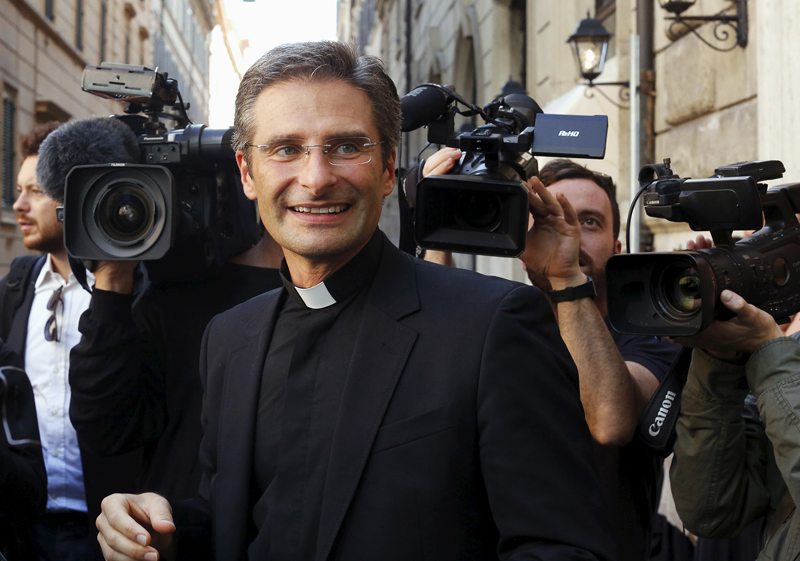
Monsignor Krzysztof Charamsa smiles as he leaves at the end of his news conference in downtown Rome on Oct. 3, 2015. Photo courtesy of REUTERS/Alessandro Bianchi
*Editors: This photo may only be republished with RNS-POLISH-PRIEST, originally transmitted on Nov. 9, 2015.
ROME (RNS) Krzysztof Charamsa says he has no regrets after he came out as gay following a long career as a priest that included 12 years as an official in the Congregation for the Doctrine of the Faith, the Vatican’s doctrinal enforcement body.
“I understood that it had nothing to do with reality,” he said of his previous double life. “A moment arrived and I couldn’t do it anymore.
“I can’t follow Jesus from the closet,” he added in a phone interview with Religion News Service from Barcelona, Spain, where he now lives with his same-sex partner.
The Polish priest announced on Oct. 3 that he was gay, on the eve of the Vatican’s synod on the family, which drew bishops from around the world.
Speaking to journalists at a press conference, he slammed the Catholic Church as “homophobic.” The Vatican quickly fired him, describing his actions as “very serious and irresponsible,” while it was left to a Polish bishop, Ryszard Kasyna, to defrock Charamsa on Oct. 21.
Charamsa’s dramatic act was welcomed by Catholic LGBT activists.
“Priests I know who have come out have often done it gradually and more privately,” said Francis DeBernardo, executive director of New Ways Ministry, a U.S. group that advocates on behalf of LGBT Catholics. But when it’s done publicly, “it’s always been received with great support.”
Despite being defrocked, Charamsa insists his vocation continues. “Today I think I am a better priest — I’m free.”
Charamsa said he tried from within the Holy See to improve the church’s approach to homosexuality, in vain.
“In the most important part of the church I couldn’t cast doubt on the strategy of homophobia; I could not use the word ‘homophobia,'” he said, adding that in the end: “I was treated like an object that gets thrown away. … We (gay priests) are treated like objects that must be silent.”
Charamsa said he enjoys living openly with his partner — “the only person who helped me” — in Barcelona, which he described as “an open city which is so tolerant.” He said he is frequently stopped by supporters in the streets and has received letters from a number of gay priests.
It’s not clear whether his announcement had any effect on the three-week synod. In the bishops’ final document, they referred to gay people only in terms of “accompanying the families in which people with homosexual tendencies live.”
That was a disappointment for gay Catholics, including Charamsa. He described the synod as “inhuman theater … which allows homosexuality to be compared to Nazism.” His remarks refer to comments made by Cardinal Robert Sarah, who during the synod said that as Nazi fascism and communism were evils of the 20th century, homosexuality, abortion and Islamic fundamentalism are the evils of the current century.
“Sarah should have been reported (to the police) for his statements, but the synod didn’t say anything,” Charamsa said. “He’s only one expression of a mentality; they think like him, because they didn’t contradict him. It’s a mentality and a paranoid vision of homosexuals.”
Remarking on the previous October’s synod, when a midway document showed an openness to gay people, Charamsa recalls how Vatican staff “entered into panic” on seeing the phrase. The paragraph was stripped from the final document in 2014, and Charamsa said there has been a complete lack of willingness to enter into dialogue with the gay community.
Having rejected the synod fathers as peddling a “manual of homophobia,” Charamsa said his hope sits with charismatic Pope Francis. The Argentine pontiff has shown a greater openness than his predecessors toward gay Catholics, although there are no signs he will try to change church doctrine on homosexuality.
“I didn’t expect much from the synod, but I do from Pope Francis. He can turn on a light in the hearts of the bishops; he is able to bring hope to divorced and gay (Catholics),” said Charamsa.
JS/MG END SCAMMELL




